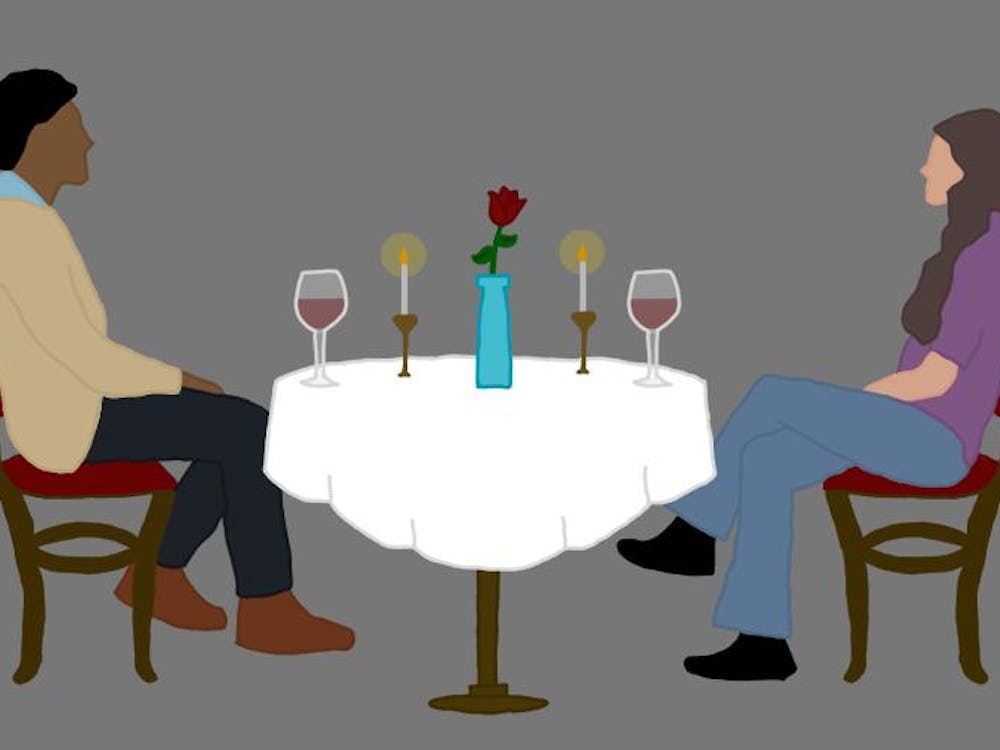By definition, the word means "to set fire to," but no definition, no dictionary, no words, can describe what Ignite has come to mean to second-year College student Katherine Klem and other young adults across the nation.
Ignite, according to its mission statement, is "a grassroots organization empowering young people to hold the tobacco industry accountable by directing public officials to act responsibly."
The organization was founded by Klem in 2002 when she was a sophomore in high school in Louisville, Ky.
"I was simply outraged that an industry that was generally accepted by the public was handing out free cigarettes to kids in Asia and saying things like, 'Today's teenager is tomorrow's potential regular customer,'" Klem said, citing a Phillip Morrisreport. "Twelve hundred Americans lose their lives to tobacco related diseases every day, so tobacco companies have to recruit what they call 'replacement smokers' from our generation."
One statistic that really struck Klem was that while 70 percent of smokers want to quit, only three percent manage to do so.
"This is why this fight is really a social justice issue for me," Klem said. "In the end, millions of people are addicted to killing themselves and multinational corporations are profiting from it."
Klem remembered one thing that really solidified her passion: a table that showed the effect of excise taxes on tobacco. For each 25 cent tax increase, the corresponding number of lives that would be saved "just grew tremendously," jumping by a couple thousand for each increment, Klem said.
"I had this pile of documents that exposed how this industry was trying to hook people to killing themselves and to make a profit, and then I was seeing this incredibly tangible way to fight back and prevent the tobacco industry from leading people to their deaths," Klem said.
The idea of creating an organization came to her a little later, when she was reading about the Seneca Falls Convention for history class.
"It dawned on me that we didn't have any national meeting, much less an organization, for youth that were fighting the tobacco industry," Klem said.
She went downstairs to the kitchen and asked her mom what she thought about creating a national organization of students to take action against tobacco companies.
"And there, in that kitchen, I became determined to start Ignite," Klem said.
In addition to working to raise the price of cigarettes in Kentucky, Klem started traveling around the country to work with other youth fighting the industry.
"Honestly, I was so amazed -- they were doing far more powerful things than we were doing in Kentucky," Klem said. "How could we not pull all these groups together and fight with one voice?"
And thus Ignite was begun.
"Ignite is definitely still in humble beginnings," Klem said. "We are completely student-led, and we're all volunteers. Because we work after class, out of our homes or dorm rooms, it can sometimes be hard to move as fast as we want."
Ignite is currently raising money to hire a staff position and has received donations from the American Association of Retired Persons, the American Heart Association and the Tobacco-Free Kids Action Fund.
But Ignite has already seen some tangible results.
For example, "the momentum other teens and I generated in Kentucky to increase the price of tobacco finally paid off," Klem said. "Last year, the state legislature increased the tobacco tax from 3 to 30 cents, which is estimated to save 10,000 lives that would've been lost to tobacco-related disease otherwise."
And as such accomplishments are being made, Ignite has expanded, starting college chapters at Wellesley, Auburn, Dartmouth, the University of Florida and a statewide chapter in Florida.
More chapters are planned, including one here at the University. Klem is working with first-year College student Shaheen Ali, who first heard about Ignite from Klem last March.
"I just remember being incredibly fascinated by it and being really passionate about the subject," Ali said. "So it just made sense that we should start a chapter here."
Ali said they hope to begin the chapter next semester. For now, they are focusing on recruiting, but after this, there are many things they could do, Ali said.
"I personally am most interested in the political aspect of holding the government accountable for [the tobacco industry] targeting youth," Ali said. "But everyone has a different goal. After we organize everything, we'll see which issues people feel the strongest about and what we should address first."
There are many possibilities since Ignite has several specific goals it hopes to reach.
Klem said Ignite wants to expose the "insane amount" of campaign contributions that tobacco companies give to politicians.
Ignite also lobbies for legislation, including laws helping stop tobacco companies from marketing to the youth.
Klem said the claim that such targeting has no significant effect is ridiculous.
"Tobacco companies wouldn't spend $4.2 million per day marketing in the U.S. if advertisements didn't change the way people viewed their product," Klem said, citing a statistic from the Campaign for Tobacco-Free Kids.
Furthermore, Ignite hopes to help give the U.S. Food and Drug Administration the power to regulate tobacco.
"Tobacco is, outrageously, the only consumable product not regulated by the FDA," Klem said.
She mentioned the FDA issued a nationwide recall of Sudafed in 1991 because a few pills may have poisoned people.
"We know that tobacco isn't poisoning a few people, it's killing 1200 a day," Klem said. "And yet, the FDA can't do anything about it."
Ignite would also like to make tobacco an electoral issue so voters would consider how candidates would treat the tobacco industry if elected.
"Eventually, this may mean we actually get college students to run for state and local office," Klem said. "There have definitely been instances of college students being elected to public office before. And, to my knowledge, they didn't have one capstone social justice issue like this to run on."
Klem said she feels students have much more power than many think.
"Ignite just held our first annual National Day of Action, on which, for the first time, students all across the country simultaneously pressured politicians to stop looking the other way," Klem said.
In addition to the influence Ignite is having nationwide, it has impacted Klem and others involved with it on a very personal level.
Four years ago, Klem's mom was speaking to the manager at the local hardware store and told him about Klem's activism efforts.
The manager said his daughter, Courtney Otto, now a freshman at Dartmouth, might be interested. Klem's mom and Otto's dad swapped business cards with their daughters' names and numbers on the back, but "nothing really ever came out of it," Otto said.
Three years later, Otto's mother, despite having never smoked, was diagnosed with lung cancer -- most likely due to second-hand smoke.
"That was kind of hard to deal with," Otto said. "Her dad smoked, and, as a journalist, she had worked in an environment where a lot of people smoked."
Otto's mother passed away May 10 of last year. About a month later, Otto was in the airport when something caught her eye.
"I saw a smoker drop a cigarette and crush it under his shoe," Otto said. "And I just thought, 'God, it's so disgusting. I wish there was someone I knew that could connect me with tobacco control.'"
Klem's name popped into her head, but she had no idea how to contact her, and her dad had lost the card with Klem's number.
Otto flew back home that evening and turned on her answering machine -- waiting for her was a message for Klem.
"It just so happened that I was going to be her advisor for the Presidential Scholars program that summer," Klem said.
Otto said it was the strangest thing that has ever happened to her.
"We scheduled to have a phone call," Otto said. "I said, 'You know, this is going to sound really weird, but I know who you are. Somewhere around my house, there's a business card floating around with your name on it.'"
Otto and Klem's connection resulted in Otto and her boyfriend starting Ignite's first college chapter -- Ignite Dartmouth.
New Hampshire, where Dartmouth is located, happens to be the only state in New England that doesn't have a smoking ban in bars and restaurants.
"It was a really fortuitous time to come to Dartmouth," Otto said.
Ignite Dartmouth has been calling senators and drumming up support on campus to get the ban -- which the Senate is voting on April 6 -- passed. Otto even testified at two of the hearings.
Otto said working with Ignite has meant a lot to her.
"What can be frustrating [is that] you have this one thing that you're really passionate about, but you don't know how to actually make anything happen," Otto said. "And for me, coming into my life when it did, Ignite was this fantastic opportunity to band with these absolutely amazing and incredibly smart people who felt the same way I did. There was this fantastic sense of relief and solidarity that there were these people that already cared about this and had put together this network."
Otto said she has met people who have changed the way she looks at what her generation is capable of doing.
"As Katherine always says, if the politicians won't do anything, we'll just have to become the politicians someday," Otto said.
This connection with Otto has also meant a lot to Klem.
"I have never felt God more in my five years of fighting the tobacco industry than in this experience," Klem said. "I absolutely couldn't believe it. We both actually found the business cards our parents had exchanged and we both carry it in our wallets as good luck charms."
Klem said her experiences with Ignite have come to mean the world to her.
"Tobacco kills more Americans every year than alcohol, AIDS, car accidents, illegal drugs, murders and suicides combined," Klem said, citing the Campaign for Tobacco-Free Kids. "If I'm going to work on any issue in public health, then this is the one. Fighting the tobacco industry is honestly just part of my identity -- it's who I am, it's what I do. It embodies so much of what I want my life to be about."






